South Africans are concerned about the impact of worsening US/South African relationships on the economy – and they’re feeling more negative about the US since Donald Trump became President.
Those are some of the key findings from a recent survey of 300 working South Africans across all demographics.
infoQuest, a South African online research company, asked respondents about a range of issues, including their response to the Budget Speech, opinions on US influence on the South African economy, and whether citizens have noticed any real changes in local infrastructure.
Awareness of Budget Speech 2025/26 elements
Three in four South Africans say they are aware of the key points from the Budget Speech, with 40% claiming to be highly informed about both its content and implications.
Surprisingly, younger citizens (18–35 years) reported higher levels of awareness than their older counterparts, suggesting that the younger generation may be more actively engaged in political and economic issues.
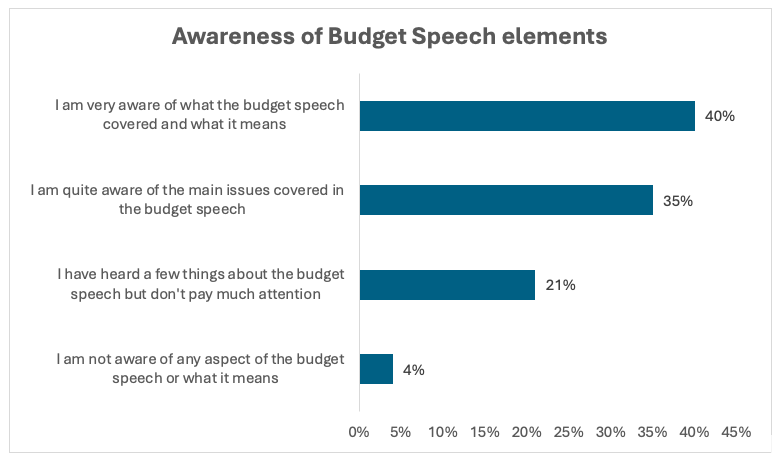
Main take-outs from the Budget Speech
The planned VAT increase over the next two years was the biggest takeaway for consumers from the Budget Speech. The rise in sin tax on alcohol and tobacco, along with the government’s promised focus on infrastructure improvements, also stood out as key points of interest.
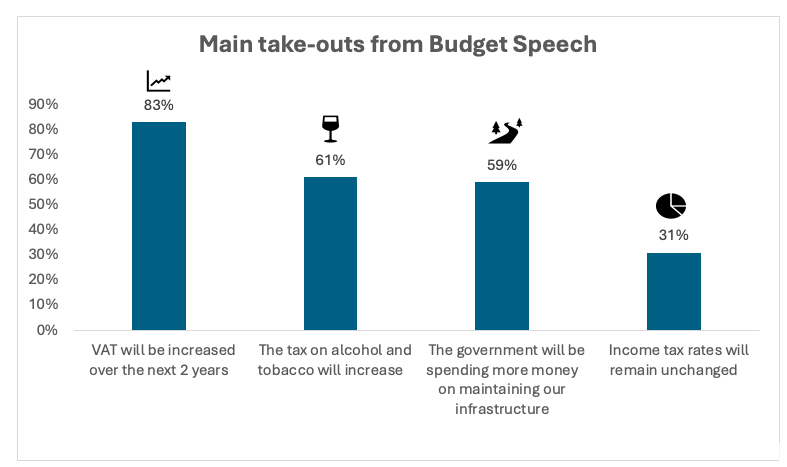
Overall reactions to Budget Speech were not positive
Just one in three employed South Africans had a positive reaction to the Budget Speech, but overall, pessimism outweighed optimism. Negative sentiment grew with age, with those 50 and older being significantly more critical than their younger counterparts.
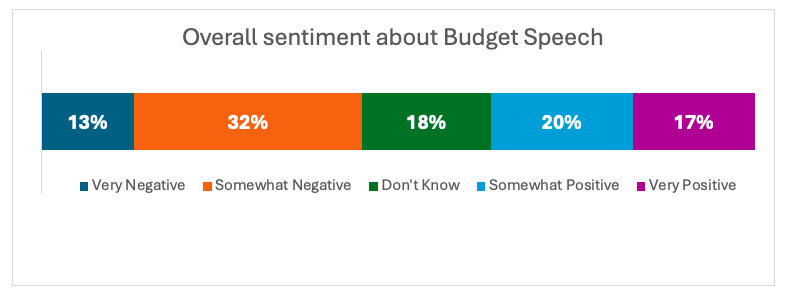
In January 2025, infoQuest surveyed South Africans on what they believed should be the government’s top priorities for 2025/26. Job creation and unemployment reduction topped the list, followed closely by tackling crime and corruption.
However, these pressing issues received little emphasis in the latest Budget Speech – highlighting a clear disconnect between government plans and citizen concerns. This misalignment may also help explain the overall lukewarm response to the budget.
Concern about US/South African relations on our economy
More than three-quarters (78%) of working South Africans are worried about the impact of US-South Africa relations on the economy, with over half expressing deep concern.
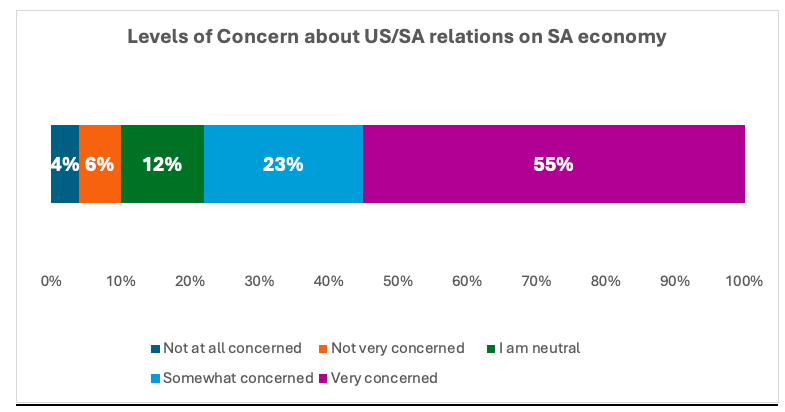
72% of South Africans believe that political and social events in the US influence South Africa.
Overall opinions of Donald Trump and Elon Musk
The survey also explored public sentiment toward Donald Trump and Elon Musk, revealing similar attitudes toward both figures – though negativity toward Trump was more pronounced.
Only 21% of South Africans held a positive view of Trump, compared to 24% for Musk, while the majority viewed them negatively (62% and 53%, respectively).
These opinions remained largely consistent across demographic groups, including age, gender, race, and income levels.
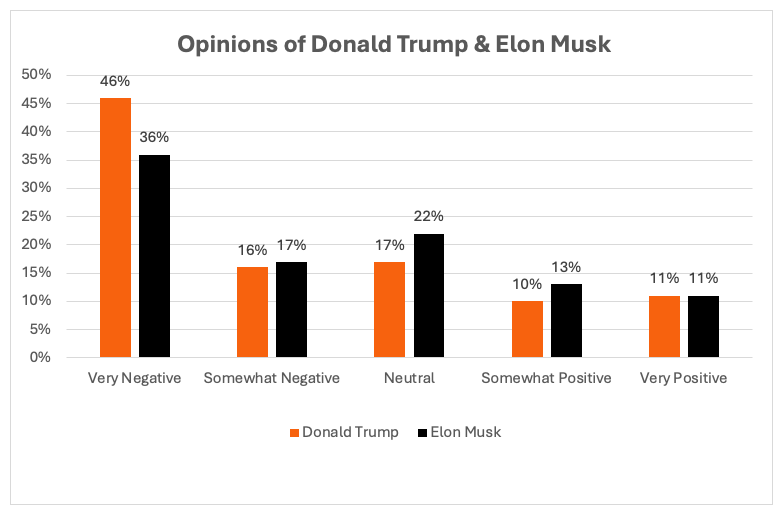
Change in opinion of the US since Trump has been President
Over 50% of South Africans feel more negative about the US since the presidency has gone to Trump. There were no significant demographic differences in this opinion.
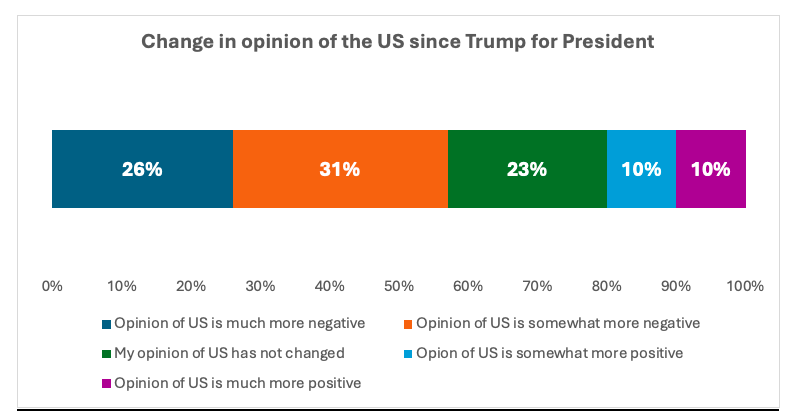 Main sources of information about the US and its Government’s policies towards South Africa
Main sources of information about the US and its Government’s policies towards South Africa
It is interesting to note that social media plays the biggest role in providing information to South Africans about the US and its policies towards South Africa – across all age categories.
- Social media 38%
- International news sources 32%
- Local news sources 27%
Closer to home: Awareness of ward councillors and noticed improvements in suburban infrastructures
About 3 in 4 South Africans claim to know who the Ward Councillor is in their area/suburb, with 72% stating that they find their communities being supportive of each other overall.
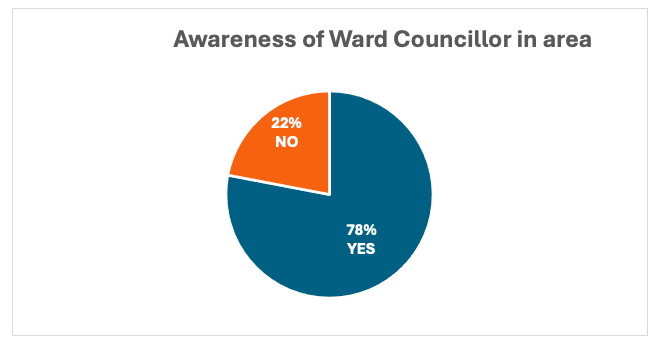
In terms of infrastructure improvements:
- 31% say that potholes are being fixed
- 30% feel that their suburbs are cleaner with less rubbish lying around
- 28% claim that parks and public spaces are being better maintained
- 25% state that streetlights are being repaired
South Africans have responded to the latest budget speech with widespread scepticism, viewing it as another missed opportunity to address deepening economic inequality, unemployment, and rising living costs.
“Beyond domestic concerns, South Africans are keeping a wary eye on global events – particularly the political turmoil in the United States – and what these shifts could mean for our economy and future,” says Claire Heckrath, MD of infoQuest. “Right now, opinions of two of the most high-profile figures – Donald Trump and Elon Musk – are overwhelmingly negative, further fuelling a sceptical view of the US.”
Closer to home, there are small but noticeable signs of progress.
“Some citizens report infrastructure improvements in their areas, and while these changes are incremental, they offer a flicker of hope that meaningful transformation is possible – albeit at a frustratingly slow pace,” Heckrath adds.
However, the overall sentiment remains one of disillusionment.
“The 2025/26 Budget has done little to restore faith, and with global uncertainties compounding economic anxieties, South Africans are demanding more than just words – they want action, accountability, and real policies that serve the many, not just the few. Until then, scepticism prevails, but if there’s one defining trait of this nation, it’s resilience.”














